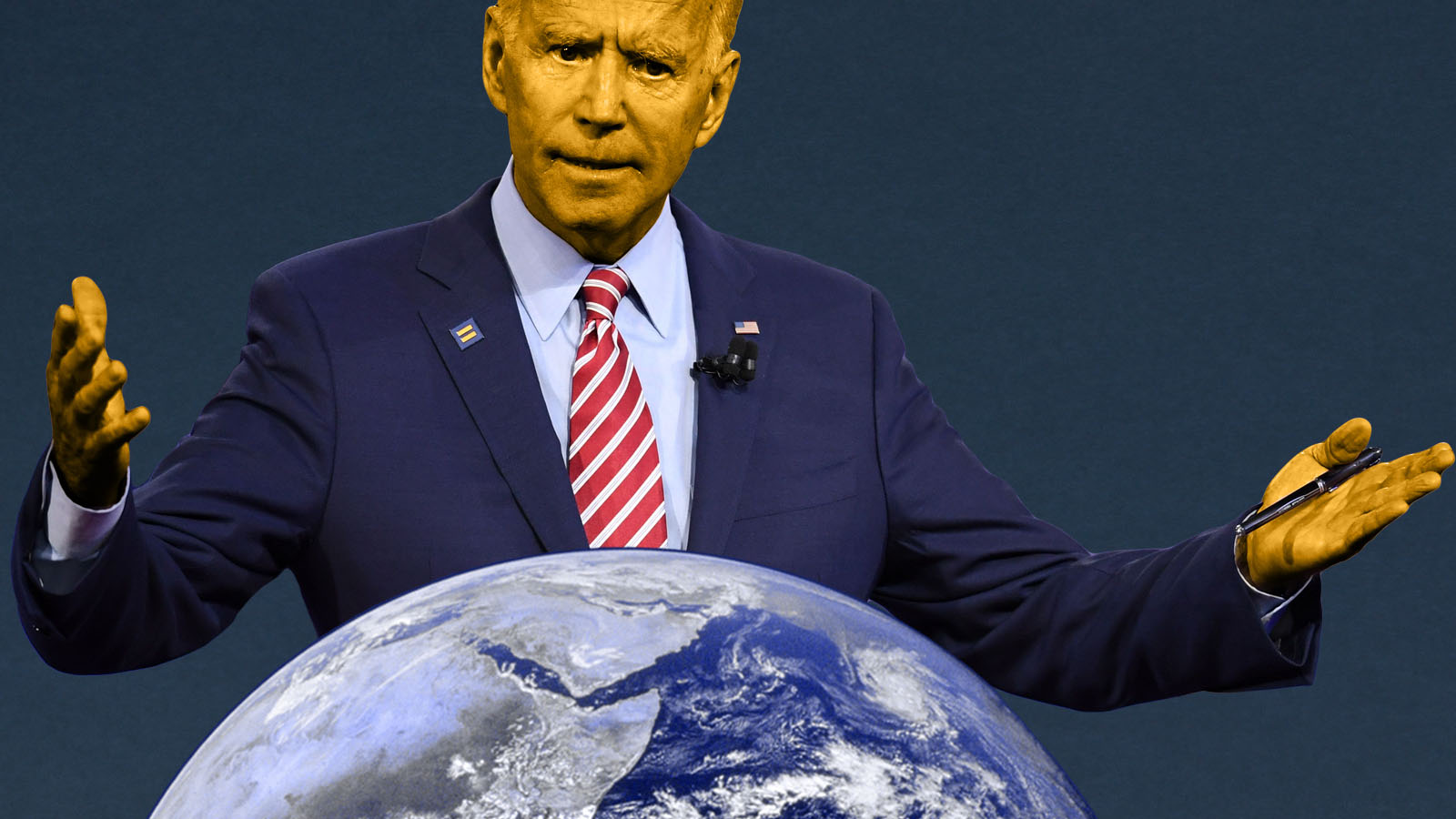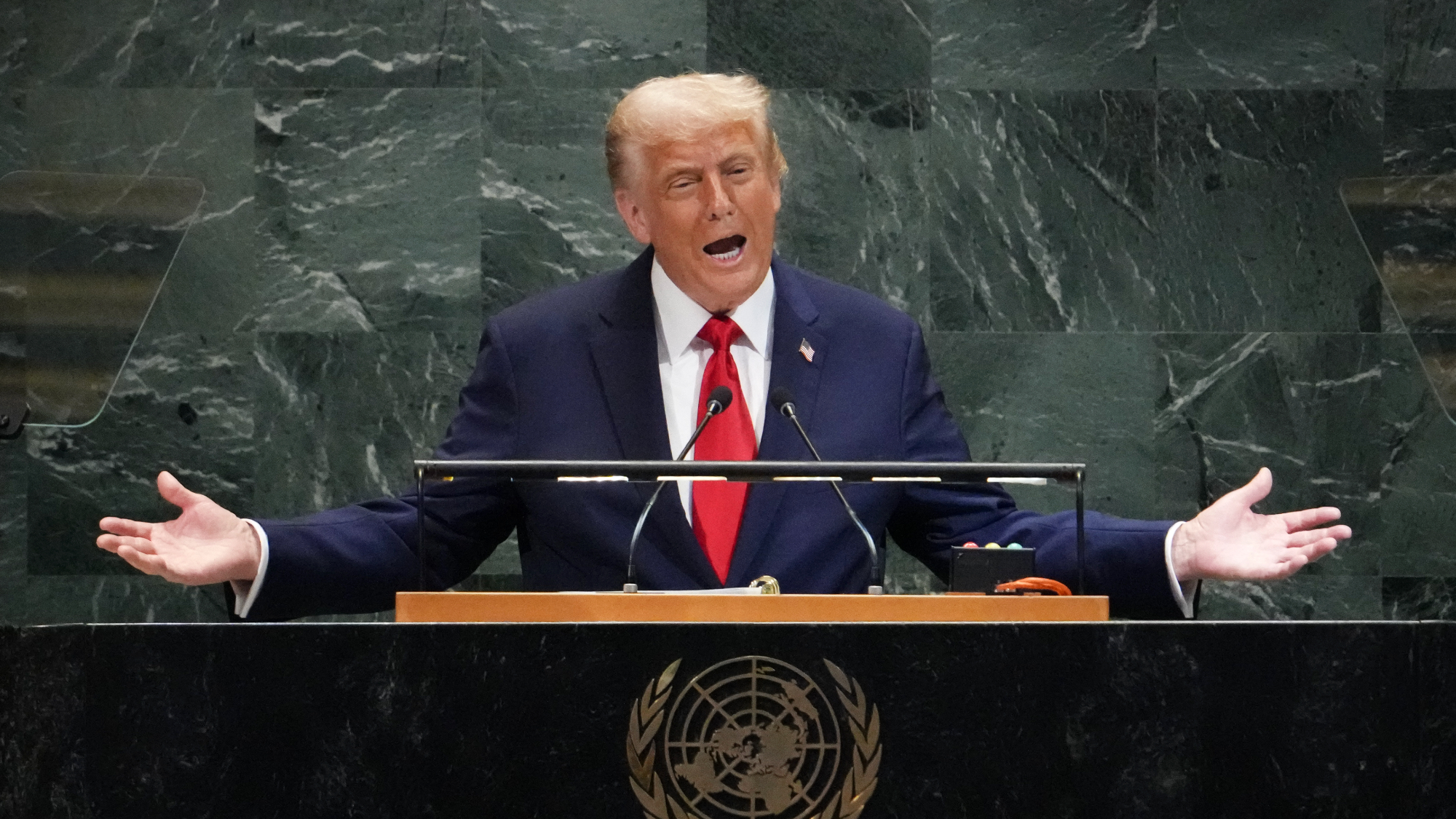What Biden should do about climate change
The sharpest opinions on the debate from around the web


A free daily email with the biggest news stories of the day – and the best features from TheWeek.com
You are now subscribed
Your newsletter sign-up was successful
President Biden last week unveiled a $2.3 billion plan to help American communities deal with extreme heat. Biden disappointed climate activists by stopping short of declaring an official climate emergency, as cities across the country face a deadly heat wave that is producing daily record-high temperatures, and drought and heat are combining to ignite record wildfires. "As president, I have a responsibility to act with urgency and resolve when our nation faces clear and present danger," Biden said as he announced his plan during a visit to a former Massachusetts coal plant that is now part of an offshore windfarm project. "And that's what climate change is about ... The health of our citizens and our communities is literally at stake."
But just days earlier, Sen. Joe Manchin (D-W.V.), a moderate Democrat from a coal state, said he would not support a new clean energy bill he had discussed with White House officials who desperately sought to bring him on board. Without Manchin's vote, the legislation essentially has no chance of passing in the 50-50 Senate. The plan was a pillar of Biden's climate agenda, and without the bill's $300 billion in tax credits and subsidies to expand the use of clean energy, including wind, solar, electric car batteries, and other clean energy technologies, Biden has limited options to attack climate change. What should Biden do now to keep pushing on his campaign promise to fight rising temperatures scientists blame for deadly heat waves, record wildfires, and intensifying storms?
Biden has to use regulations, like Obama did
If Congress won't help, Biden "has fewer tools to achieve his goals, which now seem out of reach," says The New York Times in an editorial. "His best course is to take the same regulatory path President Barack Obama was forced to follow after the Senate's last colossal climate failure — a cap and trade bill that passed the House in 2009 but died in the Senate the following year." Obama used his executive authority to make "big improvements in automobile efficiency and ordered reductions in power plant emissions." The emission rules never took effect, but "power companies managed to achieve them on their own by burning cleaner natural gas and closing inefficient coal-fired plants."
The Week
Escape your echo chamber. Get the facts behind the news, plus analysis from multiple perspectives.

Sign up for The Week's Free Newsletters
From our morning news briefing to a weekly Good News Newsletter, get the best of The Week delivered directly to your inbox.
From our morning news briefing to a weekly Good News Newsletter, get the best of The Week delivered directly to your inbox.
When Manchin pulled the plug on "even a significantly scaled-down version of Biden's climate plan," says Farhad Manjoo, also in the Times, he "all but slammed shut" a window of opportunity to do something about climate change before it's too late. Many scientists say we still shouldn't slip into a "spiral of despair," because "some of the most effective American environmental regulations were passed 'quietly,'" through "small, boring-seeming rule changes and tax credits hidden in bigger legislation." Biden can now push Democrats to make some of these incremental changes while doing more through executive action, like the call he just announced for the Interior Department to permit the installation of offshore wind farms in the Gulf of Mexico. Meanwhile: "If you aren't despairing about the climate, you aren't paying attention."
Biden has to start thinking small
At least now we know that Manchin "cannot be trusted to deliver something as basic as a single vote to protect people from the ravages of an overheating planet," says the Los Angeles Times in an editorial. The White House can stop wasting time trying to talk sense to him and focus on what it can actually accomplish. Biden has to "seriously" scale back his climate agenda and get to work. There's no time to lose, and not just because the planet is burning. Biden and his Democratic allies in Congress "need to act quickly while they still have power," because the midterms could give Republicans more clout on Capitol Hill to block him. The executive action Biden announced last week is a start. "Even if it falls short, some climate action is still better than none. And preventing even a fraction of a degree of additional warming is better than doing nothing."
Biden shouldn't misuse emergency powers
Biden should accept this defeat gracefully, because "there is no climate emergency," say the editors of National Review. Emergencies happen suddenly, like a "sneak attack." But presidents and Congress have had decades to "enact sweeping legislative changes in response to climate change concerns, and Congress has, so far, declined to do so. Choosing not to act is a choice, one that Congress is empowered to make without being overridden by the president." But Biden is "very easy to push around," so he might eventually declare his emergency to justify a whole bunch of ineffective and illegal executive orders. The trouble with that strategy is that "the president is not an elected dictator," and he can't "simply declare an emergency and then proceed to rule by decree like Charles de Gaulle."
"There's no evidence that any climate proposals, even the radical Green New Deal, would have any effect on global climate change," says Karol Markowicz in the New York Post, so caving to the Democrats' "left flank" by declaring a climate emergency would be a "naked power grab." We should have learned this lesson after we let elected officials take "extra powers" to deal with the coronavirus pandemic when it hit in 2020. They're still "abusively" clinging to their new powers, extending the emergency with each new variant. All this climate "panic" is part of the Democrats' old playbook. Keep the emergency going as long as you can so you can push your proposals through. As Obama's chief of staff Rahm Emanuel once put it, "You never want a serious crisis to go to waste."
A free daily email with the biggest news stories of the day – and the best features from TheWeek.com
Biden should get tough or get out of the way
Biden's failure to keep his climate agenda alive confirmed a big concern that "dogged him on the campaign trail," says Daniel Sherrell in The Guardian. "That he was too milquetoast" and "too norm-bound" to take the drastic measures necessary to curb global warming before it's too late. "Young people have waited in vain for the administration to evince a fiery, existential urgency around climate, a willingness to start twisting arms and cracking skulls. But Biden has shown himself either unwilling or unable to don the same brass knuckles as his opponents." If Biden's unwilling to bring Manchin around by waging "rhetorical and political war," he should bow out of the 2024 election campaign and let Democrats pick a presidential nominee young voters can trust to treat climate change like the existential emergency it is.
Harold Maass is a contributing editor at The Week. He has been writing for The Week since the 2001 debut of the U.S. print edition and served as editor of TheWeek.com when it launched in 2008. Harold started his career as a newspaper reporter in South Florida and Haiti. He has previously worked for a variety of news outlets, including The Miami Herald, ABC News and Fox News, and for several years wrote a daily roundup of financial news for The Week and Yahoo Finance.
-
 The ‘ravenous’ demand for Cornish minerals
The ‘ravenous’ demand for Cornish mineralsUnder the Radar Growing need for critical minerals to power tech has intensified ‘appetite’ for lithium, which could be a ‘huge boon’ for local economy
-
 Why are election experts taking Trump’s midterm threats seriously?
Why are election experts taking Trump’s midterm threats seriously?IN THE SPOTLIGHT As the president muses about polling place deployments and a centralized electoral system aimed at one-party control, lawmakers are taking this administration at its word
-
 ‘Restaurateurs have become millionaires’
‘Restaurateurs have become millionaires’Instant Opinion Opinion, comment and editorials of the day
-
 Trump’s EPA kills legal basis for federal climate policy
Trump’s EPA kills legal basis for federal climate policySpeed Read The government’s authority to regulate several planet-warming pollutants has been repealed
-
 The ‘mad king’: has Trump finally lost it?
The ‘mad king’: has Trump finally lost it?Talking Point Rambling speeches, wind turbine obsession, and an ‘unhinged’ letter to Norway’s prime minister have caused concern whether the rest of his term is ‘sustainable’
-
 Trump pulls US from key climate pact, other bodies
Trump pulls US from key climate pact, other bodiesSpeed Read The White House removed dozens of organizations from US participation
-
 The billionaires’ wealth tax: a catastrophe for California?
The billionaires’ wealth tax: a catastrophe for California?Talking Point Peter Thiel and Larry Page preparing to change state residency
-
 Bari Weiss’ ‘60 Minutes’ scandal is about more than one report
Bari Weiss’ ‘60 Minutes’ scandal is about more than one reportIN THE SPOTLIGHT By blocking an approved segment on a controversial prison holding US deportees in El Salvador, the editor-in-chief of CBS News has become the main story
-
 Trump aims to take down ‘global mothership’ of climate science
Trump aims to take down ‘global mothership’ of climate scienceIN THE SPOTLIGHT By moving to dismantle Colorado’s National Center for Atmospheric Research, the White House says it is targeting ‘climate alarmism’
-
 Memo signals Trump review of 233k refugees
Memo signals Trump review of 233k refugeesSpeed Read The memo also ordered all green card applications for the refugees to be halted
-
 ‘It’s ironic in so many ways’
‘It’s ironic in so many ways’Instant Opinion Opinion, comment and editorials of the day
